The Case Against American Action In Iraq
Iraq's problems cannot be fixed by the United States.
As I noted late last week, the policy that President Obama is now following in Iraq doesn’t seem to be designed to accomplish anything, other than provide him political cover as Dave Schuler noted in a comment to that post. Inevitably, this has led to critics on the left and the right to call on the President to “do something” regarding the threat that the Islamic State/ISIS poses to Iraq and, allegedly, to the rest of the world. On the left, these calls are mostly centered around the humanitarian crisis that the group’s attacks are posing to Shiite, Christian, and other religious and ethnic groups in Iraq and Syria. The criticism from the right, though, is centered more on the fact that the President isn’t being aggressive enough in fighting a terrorist threat. In some cases, the critics end up contradicting themselves, such as when they criticize the President for not following through on his “red line” comments regarding Syria last year despite the fact that the majority of Republicans opposed intervention in Syria and the fact that they are essentially arguing that we should have intervened in Syria on the same side as ISIS and the other radical elements of the Syrian rebellion.
Missing from both criticisms, though, is the argument that perhaps the best option for the United States in Iraq is to not act at all, an argument that the Ramzy Mardini makes in The New York Times:
President Obama would be best served by demonstrating military restraint. Armed intervention will not end the civil war in Iraq, and therefore will not end the atrocities being witnessed today. The horrors experienced by Iraq’s religious minorities at the hands of militants are indeed catastrophic, and the United States should do all it can short of direct military engagement to assist their safe passage – especially with regards to humanitarian aid, logistics and intelligence.
(…)
The only sustainable solution in effectively confronting ISIS is for Iraq’s Sunni Arabs to turn decisively against it. This requires a wider political solution in Baghdad. Unfortunately, that reality is still not here yet — but it’s one Washington must continuously work to broker as a credible arbiter between the warring parties. But should it get militarily involved now, Washington’s actions could undermine a power-sharing agreement from emerging down
the road.Despite conventional wisdom, the Islamic State will eventually trigger its own demise. It has mainly expanded within the areas that have supported its presence; it can neither overrun Baghdad nor hold territory in Shiite or Kurdish Iraq; its borders have, more or less, reached their growth potential. Without any major expansion of territory, it will focus mostly on consolidation of power, which carries the risk of facing resistance. Indeed, the Islamic State’s doctrine of governance is too rigid and inflexible to remain sustainable over time, while divisions within the wider insurgency will likely harden and widen. In addition, ISIS has managed to threaten every neighboring state, while geographically encircling itself of adversaries – both within Iraq and the wider Middle East.
Daniel Larison comments:
Obama has justified the decision to attack ISIS partly as a defense of American personnel in Iraq and partly as a defense of the Iraqis being targeted for annihilation by the group. As reasons for military action go, these are better than most, but I keep coming to the conclusion that these airstrikes are still a mistake. Many of the usual objections to military action don’t apply here, but a few still do. The airstrikes are being presented as a “limited” response, but it is hard to believe that military action of this kind will continue to be “limited” for very long. It is also taken for granted that military action won’t make things worse, but it is entirely possible that it will.
These airstrikes are at best a stop-gap measure to slow the advance of ISIS’s forces, and to the extent that they are effective they will likely become an ongoing commitment that the U.S. won’t be able to end for the foreseeable future. Administration officials claim that there is no plan for a “sustained” campaign, but now that airstrikes have begun it will be only a matter of time before there are demands for escalation and deeper involvement, and sooner or later I expect that Obama would yield to those demands. Having made the initial commitment and having accepted that the U.S. has a significant military role in Iraq’s internal conflicts, the U.S. will be expected to continue its commitment for as long as ISIS exists, and that will leave the U.S. policing the Iraqi civil war for months and years to come
Mardini’s points strike me as being largely spot-on. In the end, there is little that military action by the United States can do that will actually make a difference on the ground in Iraq. Even accepting the probability that we could do serious damage to the military capabilities of ISIS/Islamic State, they have demonstrated sufficient skill and support to be able to recover from those setbacks. Indeed, it’s quite probable that such attacks would only serve to rally support to their side from the Sunni communities in Iraq and Syria, while the Shia regime in Baghdad continues to twiddle its thumbs and the Kurds continue to go about creating an independent state in the north with little concern at this point for the survival of a “united” Iraq. To some extent, we are fighting for something that the people with the power in Iraq don’t even seem to want at this point. As long as that’s the case, we’re basically just wasting our time.
That point was brought home late last night when the efforts to create a new government in Baghdad seemed to descend in to chaos. After it became clear that Iraq’s Kudish President would most likely not be reappointing him, Prime Minister Nouri al-Maliki took the airwaves saying that he would not heed class for him to step aside, asserting that Iraq’s President is violating the country’s Constitution, and asserting that he would file some sort of “complaint” against the President regardless of what action was taken with regard to the appointment of a new commissioner. By Sunday evening U.S. time, there were vague reports of tanks in the streets of Baghdad and some fears that Maliki and his supporters would attempt to stage a coup. While those reports do appear to be unfounded at least at the moment, Maliki’s action did result in a strong rebuke from Secretary of State Kerry, who is presently in Australia. This morning reports say that Iraq’s President has named the deputy Parliament Speaker, a Sunni, as the new Prime Minister. How al-Maliki will react to this remains to be seen.
Given these developments, one has to wonder what the heck it is the United States is supposed to be defending with this mission that the President has authorized. Ultimately, the threat that ISIS/Islamic State poses to Iraq is rooted in the political instability in the nation itself, and it seems hard to believe that this is something that is going to be solved nearly as easily as the President seems to think, or that there’s much that the United States itself can do about situation.
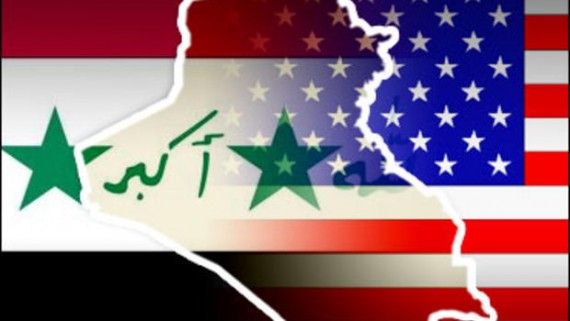


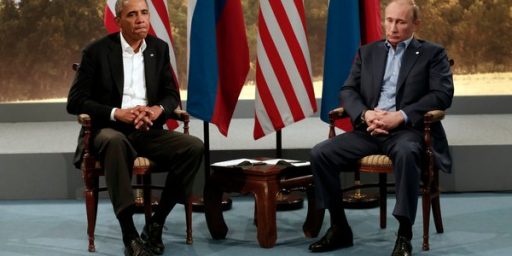
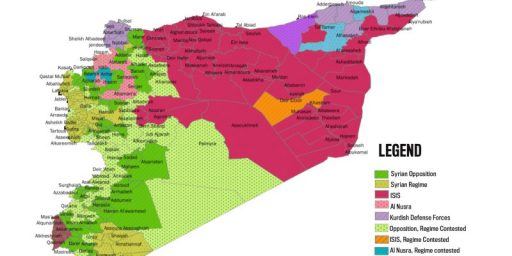
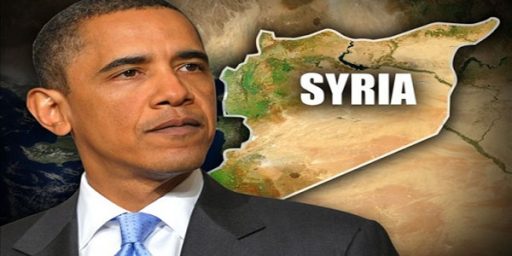
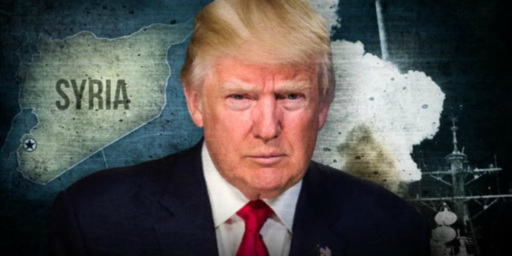
The United States and it’s European allies tried to keep the old Yugoslavia together and finally gave up. The same is probably true of Iraq.
Haven’t we already managed to push ISIS back enough to let a whole bunch of folks stuck on a mountain and waiting to be exterminated escape for the time being? That seems like an accomplishment.
I’ve not been following all of this closely at the moment, but it is pretty clear that the goal is to weaken ISIS from the air, so our allies on the ground can resist them.
@Gustopher: Exactly. Rebuilding Iraq is impossible, but letting ISIS control a vast strip of land the contains, among other things, the water systems that keep Iraq alive is also unacceptable. Pounding them in the air in the aid of the only polity in the area with a modicum of coherence looks like a good enough salve for an impossible dilemma.
Doug? WTF? Your sub-head on the main page says “Iraq’s problems cannot be fixed by the United States.” Where have I heard that before??? Oh yeah, now I remember, from the President in every press conference he has given on Iraq ever since deciding that without a Status of Forces agreement, we would be leaving, including the press conference announcing this military action. I don’t know where you are pulling this crap out of.
Argue if you will the same old slippery slope stupidity (I consider it stupidity because EVERYTHING is on the slippery slope to something) that is brought forth anytime these things come up, but don’t put words in his mouth.
Babi Yar, Cambodia, Srebrenica, Ruanda …
At some point one needs to become proactive with massacres instead of whining about them afterwards
Or to paraphrase, the fact that the US cannot resolve Iraq’s problems does not mean it cannot help to resolve a particular problem: ISIS having better heavy weaponry than the Kurds and threatening to overrun them.
Doug:
Had you read a bit further into comments you’d have seen that Lounsbury pretty well demolished Schuler’s uncharacteristically silly and entirely unsupported accusation.
We are saving our pals, the Kurds. Because they’ve been our pals, and because, as always, look at the map.
We are keeping the Kurds alive. And I would suggest the strategy is actually pretty clear: strengthen friendly forces that together form a containment field around ISIL. This is easily accomplished with arms sales and some air support. No boots needed.
The trick is to protect the Kurds…who are friendly to the US. That’s a military problem with a military solution…and it can be done at little or no cost to us.
Let the Sunni’s and Shia fight their civil war…that’s a political problem that only Iraq can solve. It is a civil war which we instigated and enflamed, by the way…but water off a ducks back by now. I will bet Bush didn’t even know the difference between the two until after he decided to invade and occupy Iraq.
The idea being bandied about by Republicans that we should have just stayed in Iraq is retarded.
It’s absolutely true we can’t “fix” Iraq. I don’t think fixing Iraq is the goal. Protecting the Kurds is a more reasonable, attainable goal. The Kurds can and will fight, but could use air support.
I’m not thrilled by this, believe me. Once again, our options all seem to suck from my point of view. Given the available options, Obama chose this as the least worst. I lean toward agreement, despite being generally anti-intervention. The trouble is that in order to get US foreign policy where I want it, eventually we have to quit doing even stuff like this. Doing that (picking mroe and more times/places to *not* intervene) intelligently is the tricky bit.
As long as we are the reigning superpower we are involved. When you control virtually all the externally-deployable military force on the planet you are involved whether you like it or not, because inaction is as much a choice as action. To allow ISIL to take out the Kurds would in effect be support for ISIL, even if all we did was sit mutely in a corner.
I certainly hope the diplomats are busy behind the scenes talking to the Turks and Jordanians and Saudis and Iranians. But right now, today, what we have is an outbreak of virulent disease which is better blocked than not.
No, this won’t solve all the problems of the middle east, but it will solve the question of whether or not we can sustain an ally. We can and we are.
So, Doug, you just read the comments that back up your position? There were several other comments that pointed out how a limited military response is actually quite likely the most sensible option, since it saves our allies and innocent people from what was looking like a gruesome extermination.
And why are John McCain and Butters still allowed on TV to talk about Iraq?
No one has ever been more wrong as often as those two.
Well, maybe Bill Kristol and Dick Morris.
By the way, I don’t think the great threat here is to Baghdad or Lebanon even the Kurds. ISIL would be nuts to try and take Baghdad – the Shia there would fight and taking vast cities is very tough work against determined opposition. The Jordanians and Israelis have more than enough air power to stop ISIL going west. The Kurds just need arms and a bit of air support and they can stop ISIL going north-east.
The Big Danger is to the south. I wonder to what degree ISIL has support in the KSA. I’d be willing to bet that their early financing had Saudi fingerprints all over it, but of course I don’t know. But if I were running ISIL I’d feint toward Erbil to rock the Kurds back, put up a blocking force around Baghdad, and drive hard toward Medina and Mecca.
Would the Saudi Air force fight? Would they invite/allow US help? As a military matter it’s awfully easy to blow up columns racing across the desert, but where would the Saudis be on all this? If ISIL once sets foot across the Saudi border they’ll claim holy ground and intervention by US forces would be incredibly politically charged.
ISIL is in a box unless they have pretty major support down south. That’s their natural path. That’s the winning move.
@Mu:
Yes, I think you are right. President Obama cannot sit out on this genocide. It would be a black mark against him forever, and against us, the American people.
http://www.catholic.org/news/international/middle_east/story.php?id=56481&wf=rsscol
If President Obama handles this correctly, he will do great credit to himself and to us. That is coming from a person who has opposed him from day one.
@michael reynolds: To get to Mecca and Medina, ISIS needs to get through the Shia-majority southern regions of Iraq. Not going to happen.
@humanoid.panda:
Look at the map. That’s open desert. It’s one thing to talk about Shiite militias holding cities, but stopping an invading force in open desert requires either air power or professional, well-managed ground forces of which Baghdad has neither.
Yeah, what Obama wants to accomplish in Iraq is pretty clearcut IMO. This all about protecting the Kurds and Northern Iraq which still relatively stable. I think Obama has known for 3-4 years now that Iraq as whole is something that the West cannot fix, but we can help the Kurds out by supplying weapons and air support.
So saving tens of thousands of people is nothing? Doug, I’m afraid that this says something about you and your sources that is rather telling.
As to open -ended commitment, why yes committing to alliances is open ended. We have open ended commitments to lots of countries and groups and one of them is Kurdistan. You seem OK about just abandoning them in the hour of need. Again, this isn’t the way to do international relations.
Then finally there are the realpolitik reasons for the intervention-the effect on the global oil market:
I have to say, Doug, it seems that you made up your mind that this intervention was bad, found a few pundits to support your position, then disregarded any inconvenient facts that contradicted your position. That’s OK for ideological hacks, but you can do better.
@michael reynolds:
The Saudis are supposed to have a good air force. I believe we sold them most of our latest toys. I think they’ll stop ISIL cold if they try that. If they fail, I’m also sure that the Obama Administration and NATO will do what they have to keep ISIL from the Saudi oilfields- and that even the US Congress will back the Administration to the hilt on that one .The case for intervention would be just too clear cut.
@stonetools:
Oh, we would intervene all right, but would we intervene before ISIL entered the KSA? Once they’re over that line the politics get really bad. Bin Laden’s big hard-on for us was supposed to be as a reaction to basing US forces in the KSA. Imagine the fun if it’s American jets and drones bombing jihadi “freedom fighters” in the environs of Medina.
Starting at a point near the Iraq/KSA border it’s a 12 hour drive to Medina. A 17 hour drive to Mecca. Where are we flying out of for those kinds of missions? Will Jordan let us base planes to kill Sunni fanatics on their way to “rescue and safeguard the Holy places of Islam that have been corrupted by Saudis in league with infidels?” Will we happen to have an aircraft carrier in the Red Sea? Or are we flying out of Israel, because that would be just peachy.
Obviously this is all a fiction writer indulging scenarios, but if it was me I’d infiltrate small groups of 50 or 60, bring them together to form a company, head balls out toward the holy places blaring jihidi propaganda the whole way. 12 hours? Will the Kingdom gets its act together that fast? Will we?
@michael reynolds:
Michael, are you planning to continue from where Tom Clancy left off :-).
I’m going to bow to The Lounsbury as to how realistic this scenario is, but quite frankly, I don’t think the US or NATO cares who holds Mecca and Medina. What they care about are those olifields and they are in the eastern part of the country, I believe. The aircraft carriers would have to be in the Persian Gulf, not the Red Sea. We would be operating out of land bases in Kuwait, Qatar and the UAE.
Anyway, it sure would make for a good scenario. Here is something more you might throw in the mix. THe people where the oilfields are located are Shia, and they do nbot like the ruling Sunni monarchy.
Enjoy spinning your scenarios, Michael. I expect a bestseller in 18 months ;-).
@Rob in CT: One alternative to doing nothing (and watching thousands more being murdered, terrorists sent to other countries, more instability) and getting heavily “bogged” down is to have a quick strike that wipes this “ISIS” group out of existence (this after giving them two hours to surrender). Problem solved, mission over.
Make no mistake: this group will kill anyone that they feel like. Attorney General Holder and others have agreed that ISIS is a huge threat to the civilized world. Not large now, but continues to grow, with lots of money (their bank accounts should be seized immediately). Force is the only language they will understand.
@stonetools:
Carriers in the Gulf would have to fly a long way over the KSA and the targets would be on the Red Sea coast. The big question is where the Kingdom will stand on all this. Will the KSA or Kuwait or Qatar let us fly against ISIL? I think that’s an open question.
Is Saudi Arabia helping us now with intelligence? That would tell me something. How much money is flowing from Saudi bank accounts to ISIL? ISIL has managed to make common cause with secular Baathists, after all, how much easier to find supporters among the same crowd that financed Al Qaeda? I’ll bet my next royalty check that there are elements in Saudi government and Saudi intelligence and Saudi military that find ISIL intoxicating. (Ditto Jordan.)
How large are those elements? How decisive will the Kingdom be in suppressing them? If there is fertile territory for ISIL it’s down there, not up in Damascus or Baghdad. They want a Caliphate, they want permanence, they want to be the Sunni heroes. Might they be welcomed with open arms by significant elements in the KSA? Beats hell out of street-fighting in Baghdad.
@michael reynolds: But then again, invading Saudi Arabia through open desert requires air support and logistics that ISIS cannot provide. Lousy as the Sudi army might be, their airforce will make minced meat of an invader advancing along the desert highways.
@humanoid.panda:
If they fight.
@Tyrell: And the way to resolve our dependence on fossil fuels is to invent a perpetual motion machine. Why won’t Obama work on that, given that is as likely as dissapearing ISIS in one blow?
@michael reynolds: Givent that unlike the Iraqi army the SA army and especially airforce are closely linked to the regime, are well paid and well trained, why won’t they fight? The only reason for them to do so is if there exists a secret alliance between SA and ISIS, and there is some evidence of that, but a lunge towards Mecca and Medina will be pretty good evidence that alliance had expired…
@humanoid.panda: Just to clarify, it is definitely conceivable that a clash between the SA army and ISIS will end up in rout of the SA army, simply because they have zero fighting experience. However, the crushing air superiority of the SA airforce will mean such a clash won’t come into being.
A large force crossing open country without air cover are basically sheep lined up for slaughter when opposed by a modern air force.
From the Times of London which is paywalled, so basically free via Pakistan:
My bold.
Like I said: south would be the smart move for the wanna-be Caliph. That’s where their original funders are, and if you want to be Caliph and Damascus isn’t available, that’s where you need to be.
More from that same link:
I would note that there were also no signs that an attack on the Kurds was imminent. And please note as well that there does appear to be some support for the IS in the KSA. It probably takes fair degree of cojones and commitment to tag and leaflet in Saudi Arabia.
@michael reynolds:
I think we can conclude one thing. Folks who think we should simply ignore ISIS because it’s not our business or that it will inevitably collapse, etc, have their heads in the sand, to use a hopefully apt metaphor. These guys really are a strategic threat. Sorry, non-interventionists.
@Mu: “Babi Yar”
Gawd. I knew that neocons loved them some Dubya Dubya 2, but I never thought that they had a problem with the USA not dropping some paratroopers into Ukraine, or whatever…..
@michael reynolds: @michael reynolds: “Oh, we would intervene all right, but would we intervene before ISIL entered the KSA? Once they’re over that line the politics get really bad.”
Yes, we would intervene before then. Any other crazy questions?
@Barry:
Before you snark, why don’t you check your assumptions? Do you see any place where I suggested intervening?